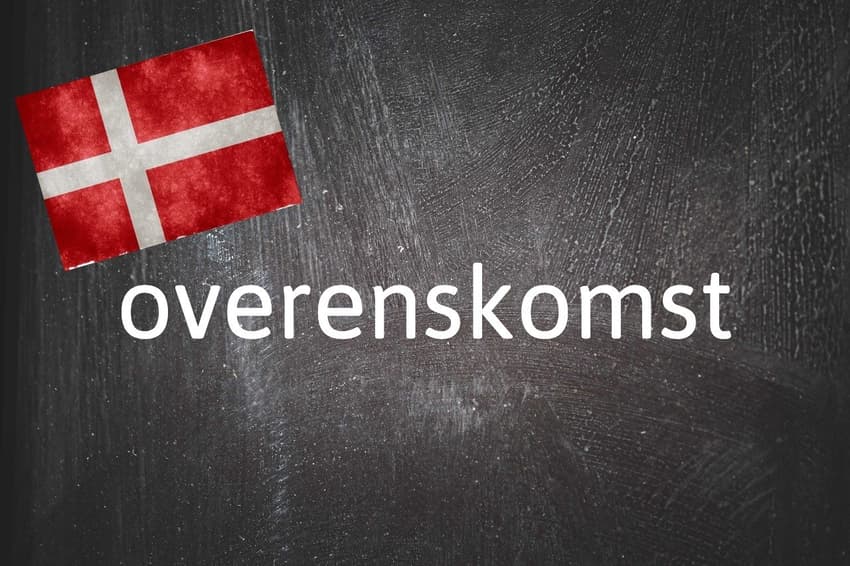Danish word of the day: Overenskomst

Photo by Francesco Ungaro on Unsplash and Nicolas Raymond/FlickR
This Danish word is frequently heard whenever there is a strike or any kind of industrial dispute.
What is overenskomst?
To be overens means to be in agreement with or match something, while the -komst suffix is derived from the verb at komme – to come or to arrive. An overenskomst, then, is the arrival at an agreement. It is used specifically in the context of negotiations between trade unions and employers’ organisations.
The agreement itself is a contract which regulates wages, for example stipulating that all employees with a certain job title must receive a salary within a certain pay band, as well as holiday allowance, overtime pay, working hours, and other benefits.
Overenskomst is therefore used to refer to a collective bargaining agreement, or a set of working conditions agreed between employers and union representatives.
READ ALSO: What is a Danish collective bargaining agreement?
Why do I need to know overenskomst?
Almost 70 percent of people in Denmark are members of a trade union, which means the majority of people will be covered by an overenskomst.
It’s when negotiations over a new overenskomst break down that strikes (or, conversely, ‘lockouts’) occur.
There are other ways of describing union negotiations and agreements with words which are also used in other contexts. These include the normal words for agreement (aftale) and solution (løsning): Jeg håber snart, der kommer en aftale, så sygeplejerskerne ikke bliver tvunget til at strejke ("I hope an agreement will be reached soon, so that nurses aren’t forced to go on strike"); Jeg tror, vi finder en god løsning under forhandlingerne ("I believe we will come up with a good solution during the negotiations").
Example
Arbejdsgiverorganisationen og fagforeningerne er langt fra hinanden, og ingen forventer en overenskomst foreløbigt.
The employers' organisation and trade unions are far apart in their demands, and a collective bargaining agreement is not expected in the near future.
Comments
See Also
What is overenskomst?
To be overens means to be in agreement with or match something, while the -komst suffix is derived from the verb at komme – to come or to arrive. An overenskomst, then, is the arrival at an agreement. It is used specifically in the context of negotiations between trade unions and employers’ organisations.
The agreement itself is a contract which regulates wages, for example stipulating that all employees with a certain job title must receive a salary within a certain pay band, as well as holiday allowance, overtime pay, working hours, and other benefits.
Overenskomst is therefore used to refer to a collective bargaining agreement, or a set of working conditions agreed between employers and union representatives.
READ ALSO: What is a Danish collective bargaining agreement?
Why do I need to know overenskomst?
Almost 70 percent of people in Denmark are members of a trade union, which means the majority of people will be covered by an overenskomst.
It’s when negotiations over a new overenskomst break down that strikes (or, conversely, ‘lockouts’) occur.
There are other ways of describing union negotiations and agreements with words which are also used in other contexts. These include the normal words for agreement (aftale) and solution (løsning): Jeg håber snart, der kommer en aftale, så sygeplejerskerne ikke bliver tvunget til at strejke ("I hope an agreement will be reached soon, so that nurses aren’t forced to go on strike"); Jeg tror, vi finder en god løsning under forhandlingerne ("I believe we will come up with a good solution during the negotiations").
Example
Arbejdsgiverorganisationen og fagforeningerne er langt fra hinanden, og ingen forventer en overenskomst foreløbigt.
The employers' organisation and trade unions are far apart in their demands, and a collective bargaining agreement is not expected in the near future.
Join the conversation in our comments section below. Share your own views and experience and if you have a question or suggestion for our journalists then email us at [email protected].
Please keep comments civil, constructive and on topic – and make sure to read our terms of use before getting involved.
Please log in here to leave a comment.